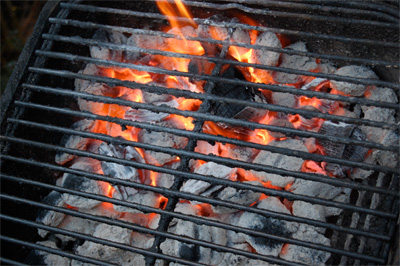It's easier to grill the steak than to write about grilling it. At least, to write about it in a manner that someone else can use to duplicate your results.... So we're going to keep it simple and real. Here goes:
This section contains some basic information about grills, charcoals, wood chips, and other accoutrements of outdoor grilling. You won't agree with everything we say. Heck, WE don't even agree with each other all of the time. That's OK.
We hope that we can give you some basic information to get you started, and then you can experiment until you find the way that's right for you.
Please note: If you live outside of the Gulf Coast states of the U.S., cooking instructions, times and temperatures will vary. We are writing this during the first week of December, and our outside, ambient temperature is hovering at 79 degrees F at Kate's house, and closer to 50 at Alison's. MOM and DAD's Louisiana cottage is in the sweltering 80s.
Yes, snow cover makes a difference, and if you live north of the Mason-Dixon, you will have to increase the amount of charcoal you use, and know that your grill will cool a lot faster than ours.... We just hope you don't let that snow keep you inside! Keep the grill away from the siding, and get going! Happy Grilling!


Where does the word barbecue come from?
Harold McGee, in his oft-referenced tome, “On Food and Cooking,” says that “The term barbecue come via the Spanish barbacoa from the West Indes.” It seems that the Indians there would hot-smoke foods like meat and fish over a lattice of green branches suspended from corner posts. Of course, most of the meat and fish they cooked consisted of the whole animal, gutted, cleaned, and placed over the fire for hours. The Indians called the contraption of branches and posts that held the meat, “barbacoa.”
The French, having already seen this method of cooking in Brazil, adopted the indigenous Brazilian word for the same process: “boucan.” Interestingly, the first pirates, being mostly French ex-navy men, ate a lot of this stuff, and hence, were called “boucan-eers.”
The process was adopted in Colonial America, brought by the French and Spanish, and was called “barbecue.” Such barbecues were festive bouts of mass entertainment. By the early 1900’s, the word had evolved into our modern usage meaning “meat, slow cooked over fire and coals, and highly flavored, or the event at which such food is served.”
That’s our take, anyway, and we’re sticking to it!